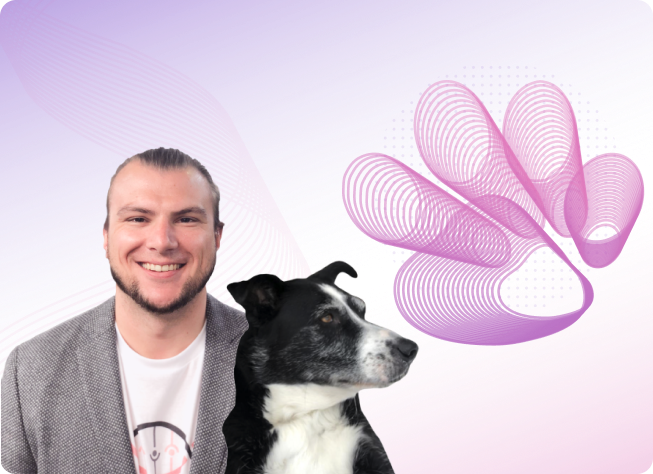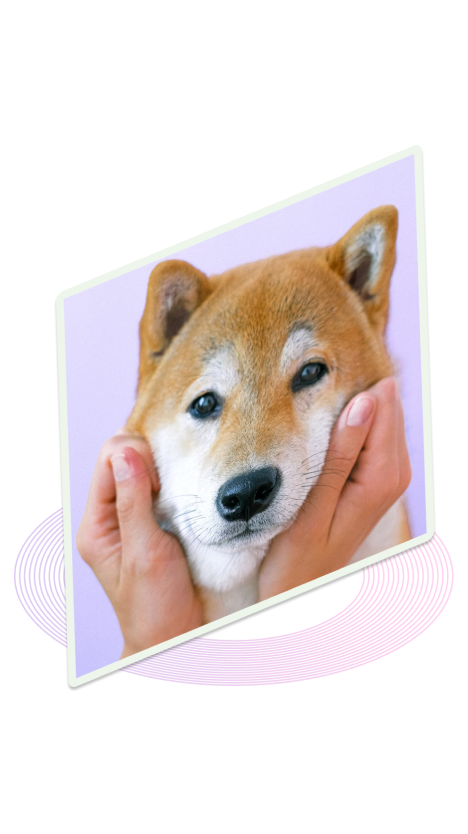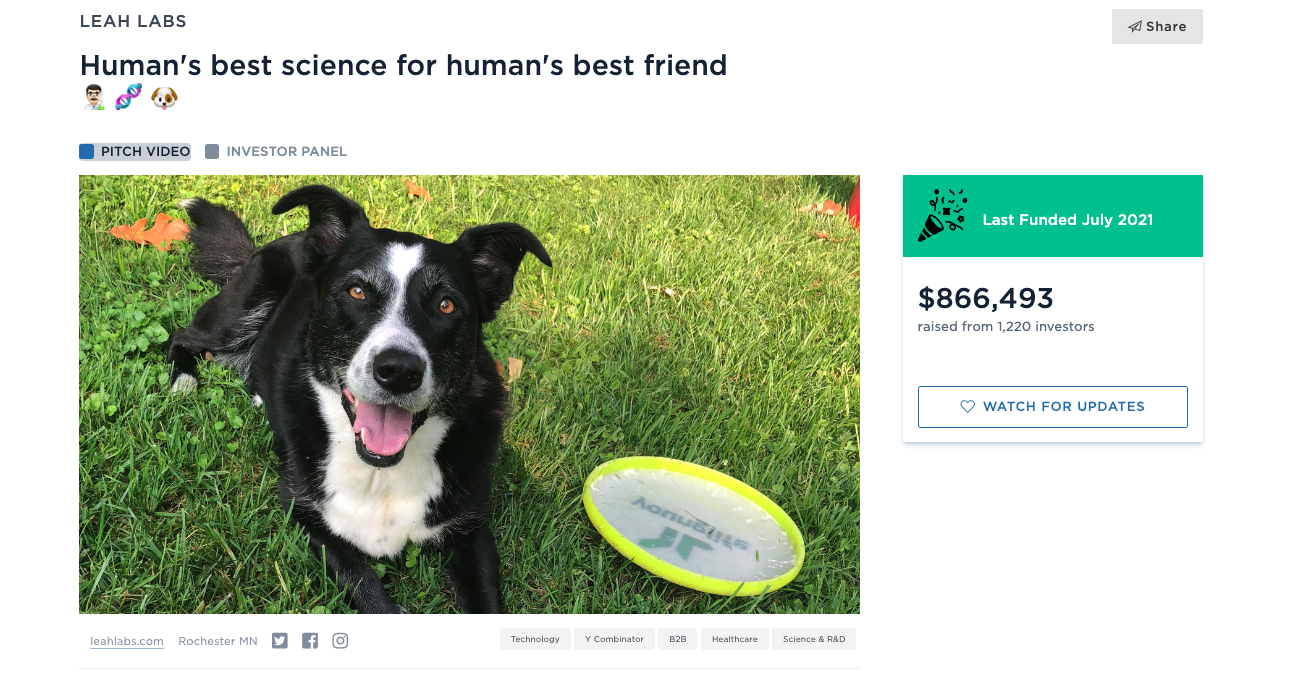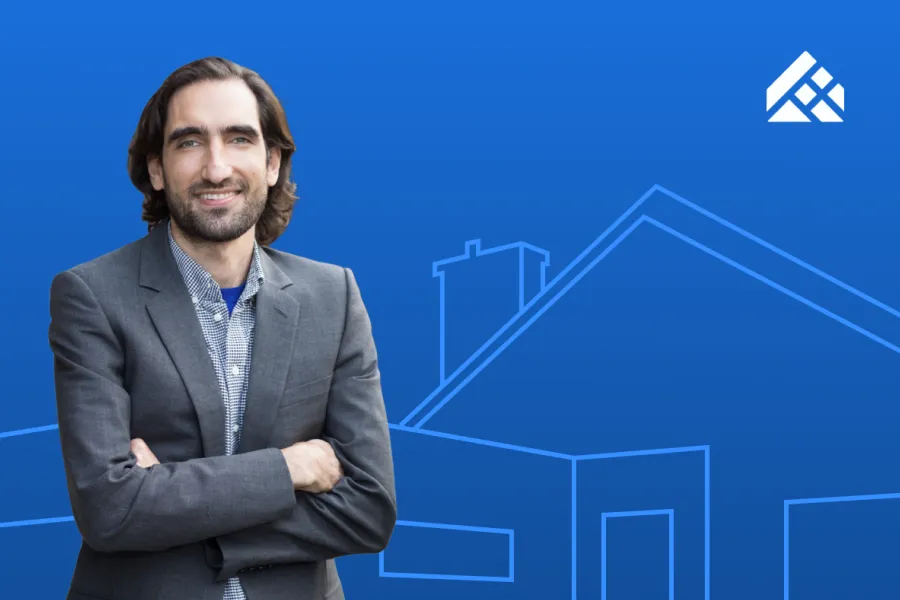
Fighting Cancer in Dogs
How LEAH Labs raised $866K from pet lovers and closed $2.1M in seed funding as a result


- It was Demo Day for YC's Winter 2019 batch.
- Among a slew of software companies, Wes Wierson pitched his biotech: LEAH Labs was using gene editing to build an affordable cure for cancer in dogs.
- By the end of Demo Day, LEAH raised just $20,000. They had just 4 months of runway.
- Without an email list, nor even a product on the market, Wes published his pitch on Wefunder. To his surprise, hundreds of dog owners from all across the country showed up.
- Over 2 years and 2 community rounds, Wes raised $866K from dog lovers for LEAH to stay alive and hit all of its promised milestones.
- Even better, the turnout from the community validated LEAH's thesis and led to over $2.1M in follow-on funding from angels and seed funds.
FIGHTING CANCER IN DOGS
We’ll have LEAH Labs Founder & CEO Wes Wierson take it from here →

What is LEAH Labs?
LEAH Labs is using gene editing to build curative therapies for dogs at a cost that pet owners can afford.
I founded LEAH Labs when I was finishing my PhD in molecular genetics at Iowa State University. I was developing breakthrough gene editing technologies in zebrafish, and I knew that I wanted to apply gene editing to solve consumer-level problems one day. One of my professors, now my co-founder, was always entrepreneurial and felt the same way.
In bouncing ideas around, we recognized that dogs and humans get the same types of diseases—especially cancers. They have the same genetic mutations, look the same on a physiological and cellular level, and even express the same proteins in many cases. Because of that, cancers in humans and dogs are great models for one another.
Generally speaking, scientists first study disease in an animal model. They develop hypotheses around potential therapies, and test them in animal models like mice. When a therapy is promising, they take it to a human study for drug development. But that method often fails, because those mouse models are induced (like transplanting human tumors into mice)—they're not natural diseases.
Every year, over 6,000,000 dogs die of cancer—a natural disease. Out of the 90 million pet dogs in the USA right now, ⅓ of them will get cancer. Their existing treatment options are invasive surgeries and/or repurposed regimens of chemotherapies that were first developed for humans. On top of that, they’re expensive ($7,000–$12,000) and ultimately non-curative.
We realized that, using the same technology I developed in grad school to "make zebrafish glow" (see picture below), we could engineer living cells so they can seek out cancer, recognize it like a lock and key, and then destroy it. It’s called “CAR-T cell therapy.” CAR-T was first developed in the early 1990s, first applied to humans in the 2000s, first FDA approved in 2017, and is now curing patients that are quite literally on their deathbeds.
Dogs get the same cancers that are now CAR-T curable, and we’re the first company bringing this therapy to pets. We’re using gene editing technology to apply this tech to dogs—allowing us to fight their cancers faster, cheaper, more efficiently, and, hopefully, permanently.

I took hundreds of calls, VC meetings, angel meetings, and angel fund meetings. We didn’t have anything other than an idea, and I was a first-time, naive CEO who didn’t understand how to tell our story quite yet.
Wes WiersonFounder & CEO of LEAH Labs
We raised our 1st Community Round on Wefunder out of necessity.
When LEAH Labs got accepted to YC’s Winter 2019 batch, I hadn’t defended my PhD yet. LEAH Labs hadn’t run a single experiment. We hadn’t even incorporated the company. But YC saw the potential, and I jumped in full time just a few weeks later.
YC was trial by fire. They throw you in, and all of a sudden you’re a founder-CEO. Those four months, we faced challenges to get the proof of concept data that we would have needed to raise a huge round on a crazy valuation out of Demo Day. As a software company, you can build an MVP over a single weekend and have users, growth, and revenue by Demo Day. But as a biotech, our gene editing and CAR-T experiments alone can take 10-14 days at a time.
At Demo Day, we pitched and got $10,000 from two angel investors. They were tech people, not bio people—but they had dogs, had lost previous dogs to cancer, and thought it was cool. After that, we didn't get a single investor.
I took hundreds of calls, VC meetings, angel meetings, and angel fund meetings. We didn't have anything other than an idea, and I was a first-time, naive CEO who didn't understand how to tell our story quite yet.
VCs never believed there was a market—would everyday people really pay between $5,000 to $10,000 to treat their sick pets? Of course, these VCs certainly could pay that much if their dogs got sick. But they were just too far away from the fact that for most dog owners, dogs really are part of the family.
There are people who would pay for therapies and treatments for their dogs before they would pay for their own needs—before they would even buy groceries. And that community is really strong.
There are over 90 million pet dogs in the USA, and the companion animal market keeps growing. If you've owned more than two or three dogs in your life, you've probably lost one to cancer. That's just what the statistics tell you.
We realized that raising money from the community could be a great opportunity, and sure enough, it was. Over 6 months on Wefunder, we raised $468,000.
There are people who would pay for therapies and treatments for their dogs before they would even buy groceries. And that community is really strong.
Wes WiersonFounder & CEO of LEAH Labs
Why did people invest?
The impact of our 1st Community Round
Before our Community Round, we had 3-4 months of runway. We weren’t doing any science. The only priority was staying alive and raising more capital.
Because of that first $468,000 from passionate pet owners, we were able to stay employed, keep the company alive, and finish writing the grants we were working on.
We wrote and submitted 4 grants during our 1st community round, and ended up winning all of them—to the tune of $394k. Without Wefunder investors keeping our dream funded, we wouldn't have been alive long enough to see these grants be awarded.
Before the raise, we had no mailing list, no aggregated “community”—we’re a biotech company that’s years away from getting a product on the market. But through the raise, we built a community of dog lovers and pet lovers who deeply understand what it would mean to lose their furry family members, and what it would mean to have a therapy that could actually save them.
Without Wefunder investors keeping our dream funded, we wouldn’t have been alive long enough to see these grants be awarded.
Wes WiersonFounder & CEO of LEAH Labs
Why we raised our 2nd Community Round
A year after our first Community Round, we went back to Wefunder after crushing milestones we promised to our investors in our first Community Round. This time, we thought that Wefunder could help us raise a quick few hundred thousand dollars, which we could then bridge into a larger seed round.
That's exactly what happened. Over 10 weeks, we raised $397,555. Then we closed off the Community Round so that we could start to raise in the more traditional way. In our following seed round, we raised another $1.7 million, making a total seed round of just over $2M thanks to the momentum that started with Wefunder.
Raising another successful Community Round before approaching angel investors showed them that there really are a ton of dog owners out there who need better options when their dogs are sick, and that LEAH is building something they want.
As of the date of publishing (March 2023), we've now won an additional $487K in grant funding, again in large part because of Wefunder investors playing a critical role to keep our business alive.
Summary
Leah Labs raised $866,493 from 1,220 investors over two Community Rounds.

Snapshot of Leah Labs's Community Round (source wefunder.com/leah)
Before the Raise
- Participated in Y Combinator's Winter 2019 Batch
- 2 midwest seed funds for $105,000
- $20,000 in angel checks from YC Demo Day
1st Community Round
- Raised $468,000 from 844 investors
- Started and finished raise in 6 months
2nd Community Round
- Raised $397,555 from 376 investors
- Started and finished raise in 2.5 months
- Received $1.7M in follow-on seed funding from angels and angel funds












































